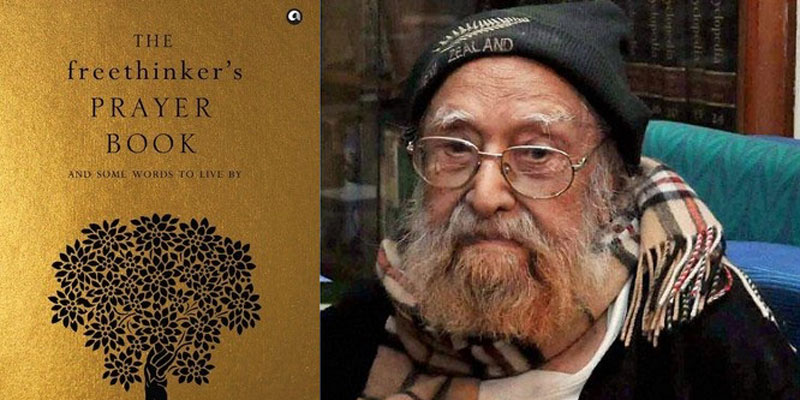

How many people remain active after 60? Or 70? Or 80? The number goes down as the old-ness of the person grows. People get retired. They spend their time in leisure. But Khushwant Singh was a rare example. He lived his dream till his last breath.
At the ripe age of 97, he authored a book The Freethinker’s Prayer Book And Some Words to Live By (Aleph, 2012). The book is a collection of precepts, prayers and practical advice by prophets, poets and philosophers that the man of letters lived by.
Right at the introduction, Singh speaks the truth – plain and simple.
“By the time this book is published, I will be ninety-seven. I am a very old man. And there is one eternal truth I can tell you right away: Old age is not pleasant; it buggers up your life. I am not yet senile, but my memory, of which I was very proud, is failing. Though I can still read, my hands shake so much that it is difficult to write anything legible. I have been spared the indignity of shitting in bed pans and having nurses wipe my bottom, but I often need assistance to get to the toilet. I am on more pills than I can count. In short, my body is giving up.”
Then he speaks his mind, staring at death. He explicitly shows his desire to die and choose to discuss it at length. He does not shy away from saying that he was scared of the thought that he will die someday. But he wishes a swift and painless death.
It seems that he attempted to find answers to what will happen after his death. But being an agnostic, it was tough to find solace. It is pretty apparent that he submitted to mystery when he says:
“People who have religion seem to derive comfort from the belief that they will meet their Maker after they die, or that they will be reborn in some form. The more self-righteous among them are convinced that they will ascend straight to heaven. As an agnostic, I have no such comfort. So be it. I have no regrets.”
For a person who did not believe in God, this book surprises us all. It contains his favourite passages from the seminal texts of the world’s major faiths. The person, who claimed to be agnostic, knew his Bible, Granth Sahib, Quran and the Vedas very well. The songs of mystics and saints like Kabir, Rumi and Mother Teresa seamlessly mix with the verse of poets like Ghalib, Tagore and Keats.
The book looks like a quest to find oneself by remembering the fading life events and finding answers through reason, logic and philosophy. But Singh remains characteristically irreverent. He writes:
“Once you have decided not to bow to any gods, and if you have a good bullshit detector, it is possible to separate the sublime from the ridiculous and derive inspiration from the words of prophets and poets, gurus and rogues, grave men and clowns. There is a lot to be learned from both the sacred and the profane. I have done that nearly all my life and put down in my notebooks hundreds of lines from different sources that appealed to me… I offer them to you as life codes from an ancient and unrepentant agnostic. Read them with an open mind and an open heart.”
This book by ‘Sardar in the Bulb’ (immortalised by the cartoonist Mario Miranda) will light up our lives just like the countless anecdotes he has told us through his books. You can turn to his words on any page of this book at any time and any day to find the meaning of things which does not make sense.
*Khushwant Singh died on March 20, 2014 at the age of 99.
Perfume makes an impression. It's why many people are willing to spend a pretty penny…
Parimatch Betting Company is one of the most famous online sports betting companies in India.…
The history of gambling spans thousands of years. Various kinds of gambling were chronicled in…
Gambling entertainment has attracted people since ancient civilizations. Today, the range of casino games is…
Photo by michael weir on Unsplash The country is an athletic and economic powerhouse and…
Cyber attacks are the biggest concern, after the increasing scams, and spam has diversified to…